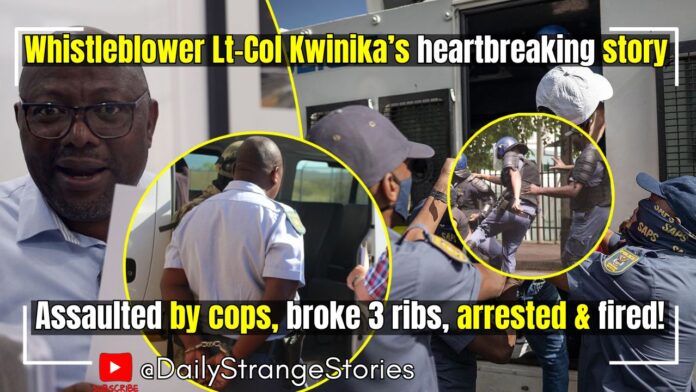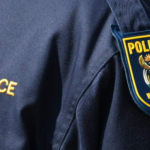In the world of law enforcement, where trust and integrity should stand as pillars, one man's pursuit of truth led to a harrowing personal ordeal. Former Lieutenant Colonel Mpho Kwinika, a dedicated officer who once led the South African Police Union, found himself at the center of a storm after uncovering a scheme involving high-ranking police officials. His actions exposed an attempt to misuse public funds for political gain, but the cost was severe: an assault by his own colleagues that left him with three broken ribs, a broken hand, a damaged eardrum, and impaired vision in his left eye. This incident, followed by his arrest and eventual dismissal from the force, paints a picture of retaliation against those who dare to challenge corruption within the ranks.
Kwinika's story begins with his role in revealing a plot to acquire an expensive electronic device known as a grabber, intended to intercept communications during a major political event. Now, six years later, he seeks justice and reinstatement, hoping to share his experiences at a new commission of inquiry.
The roots of Kwinika's troubles trace back to late 2017, when whispers of irregular procurement surfaced within the South African Police Service's crime intelligence division. At that time, officials allegedly planned to purchase a sophisticated tool called an IMSI-catcher, or grabber, for a staggering 45 million rand. This device, which mimics a cell tower to capture data from nearby mobile phones, was reportedly meant for deployment at the African National Congress conference in December 2017. The goal, according to whistleblowers, was to eavesdrop on communications and potentially influence the conference's outcomes in favor of certain factions. The price tag raised eyebrows because it appeared inflated by more than 35 million rand compared to similar equipment's market value. Brigadier Tiyani Hlungwani, who managed the crime intelligence secret services account, stepped forward with details about how funds were being maneuvered for this purchase. Kwinika, as a union leader and officer, supported Hlungwani's disclosures, helping to bring the matter into the light.
This exposure did not go unnoticed. High-level figures, including then-national police commissioner Khehla Sitole, faced scrutiny. Documents related to the grabber deal were classified, blocking investigations by the Independent Police Investigative Directorate. Kwinika saw this as a deliberate effort to conceal wrongdoing. On 20 March 2019, he took a bold step by sending a memorandum to President Cyril Ramaphosa and the police minister at the time, Bheki Cele. In it, he questioned Sitole's suitability to lead the police service, pointing out how the classification of documents hindered probes into the potential misuse of millions in public money for political purposes. The presidency acknowledged the letter but forwarded it to the police department for handling, noting that ministry was better positioned to address the concerns.
Just seven days later, on 27 March 2019, Kwinika's life took a dramatic turn. While visiting Sunnyside in Pretoria and sitting in his car to charge his phone, he noticed a flurry of blue lights approaching. A group of police officers surrounded his vehicle, claiming they were conducting an operation called Okae Molao. Without warning, they pulled him from the car and began an assault that pinned him to the ground. Despite Kwinika identifying himself as a fellow officer, the attack continued, resulting in his serious injuries: three fractured ribs that made breathing painful, a broken hand that limited his mobility, a ruptured eardrum affecting his hearing, and damage to his left eye that blurred his vision. He had been holding a glass of cranberry juice at the time, but later accounts suggested attempts to fabricate evidence of alcohol consumption to justify the arrest.
Thrown into a cell at the Sunnyside police station, Kwinika endured hours of agony without medical care. Officers charged him with causing a public disturbance, drinking in public, assaulting police, and resisting arrest. These accusations stemmed from what was described as a minor noise complaint, but Kwinika maintained the encounter was premeditated. In the days leading up to this, he had noticed a BMW tailing him, heightening his suspicions of being targeted. The National Prosecuting Authority later reviewed the case and withdrew all charges on 1 July 2020, concluding that the police response had been excessive and supported the idea of a planned arrest. The authority's decision highlighted how the officers overreacted to a trivial matter, aligning with Kwinika's account of retaliation.
Even with the charges dropped, the repercussions persisted. The Independent Police Investigative Directorate investigated the incident and found the assaulting officers at fault, yet no immediate action followed against them. Instead, Kwinika faced internal disciplinary proceedings from his employer shortly after. He suspected the timing—coming so soon after his memorandum to the president—was no coincidence, linking it to higher-ups in the police service orchestrating payback for his whistleblowing. By 2021, these proceedings led to his dismissal from the South African Police Service, leaving him jobless while those implicated in the grabber scandal seemed protected. Kwinika opened a criminal case against his attackers, emphasizing in his statement the need for accountability and an inquiry into the protections afforded to wrongdoers.
The grabber scandal itself unfolded further details that underscored the depth of the alleged corruption. Discussions about the purchase reportedly took place at a hotel in Pretoria on 13 December 2017, involving a businessman named Inbanathan Kistiah from Durban. His company, I-View, had secured over 54 million rand in police tenders, and he later faced corruption charges alongside another former police commissioner, Khomotso Phahlane, related to software procurement. The grabber was intended to harvest data from mobile devices, allowing interception of calls and messages without users' knowledge. Whistleblowers like Hlungwani alleged the device would be used to sway votes at the ANC conference, turning a law enforcement tool into a political weapon. Hlungwani himself suffered consequences, facing suspension from April 2019 until 2024 through an accelerated disciplinary process, mirroring Kwinika's victimization.
Sitole, the commissioner at the center of the storm, resisted declassifying documents, leading to a public clash with the investigative directorate. A court ruling in the Pretoria high court later condemned Sitole and his deputies for breaching their duties by obstructing the probe, prioritizing party interests over national ones. The Supreme Court of Appeal dismissed Sitole's attempt to challenge this on 1 June 2021. Ultimately, President Ramaphosa ended Sitole's tenure on 1 February 2022 through what was called a mutual agreement, following these judicial findings. When approached recently, Sitole declined to discuss police matters, stating he was not permitted to do so.
Kwinika's fight for justice extended beyond his dismissal. He challenged it at the Safety and Security Sectoral Bargaining Council, arguing the process was unfair both in procedure and substance. However, delays plagued the case: no hearing date was set, and interventions from the Commission for Conciliation, Mediation and Arbitration failed to speed things up. On 31 May 2023, the commission revoked the council's accreditation due to noncompliance issues. Progress finally seemed possible on 17 September 2024, when a station commander testified that records had been altered, confirming tampering in Kwinika's case. But the matter was postponed, and tragically, the arbitrator passed away on 20 September 2024, with records reportedly lost as a result. Kwinika's requests for copies went unanswered, leaving him in limbo.
During his disciplinary hearings, Kwinika presented evidence showing how police documents were manipulated to suggest he had alcohol in his system, despite original reports proving otherwise. He noted that the state employed three senior counsels against him, an unusual level of resources for such a process, which suppressed information he provided. Even with the prosecuting authority's letter exonerating him, the police pushed forward with his firing, seemingly to shield the officers involved in the assault. As president of the South African Police Union, Kwinika had also faced expulsion, but a 2020 Labour Court ruling declared those actions unlawful, ordering his reinstatement as a member and leader. Yet, the broader police service continued to sideline him.
The history of IMSI-catchers in South African policing adds layers to this narrative, revealing a pattern of misuse and secrecy. As far back as August 2015, authorities arrested individuals attempting to sell an illegally obtained grabber. In that case, a millionaire from Welkom had imported the device with apparent backing from senior police, initially for monitoring syndicates involved in gold, cigarettes, and rhino horn trafficking. The buyer paid around 15 million rand for the equipment and even gifted a luxury vehicle worth 874,000 rand, but the deal soured, leading to a sting operation by the Hawks who posed as interested parties. By 2021, reports emerged that crime intelligence had spent nearly 112 million rand on surveillance gear, including 13 grabbers, 15 drones, and 12 mobile location vehicles, much of which sat unused due to lacking proper clearances. An internal memo noted that existing grabbers were outdated, limited to 3G signals, prompting the push for upgrades. A five-year exemption gazetted on 19 May 2023 by the former justice minister finally allowed their use, but questions lingered about earlier procurements.
Kwinika's ordeal connects to broader allegations of corruption infiltrating law enforcement. He has expressed a desire to testify at the upcoming commission of inquiry sparked by claims from KwaZulu-Natal police commissioner Lieutenant General Nhlanhla Mkhwanazi. On 6 July 2024, Mkhwanazi held a press briefing accusing senior politicians and police leaders, including Police Minister Senzo Mchunu and Deputy National Commissioner Shadrack Sibiya, of protecting criminal syndicates. He alleged they disbanded a task team investigating political killings in KwaZulu-Natal and hid sensitive dockets implicating figures in government, law enforcement, and the judiciary. This task team, focused on murders tied to political motives, was shut down abruptly, with officers reassigned and files locked away. Mkhwanazi insisted the orders came directly from the minister, not the national commissioner, and that it undermined efforts to combat crime.
Mchunu, placed on leave of absence by President Ramaphosa amid these accusations, has denied involvement. In court documents responding to a challenge from the MK Party seeking his full dismissal, Mchunu explained that he directed the national commissioner, General Fannie Masemola, to close the task team after assessing its effectiveness. He claimed Masemola provided a plan for the disbandment without objection, and that the move was part of broader crime-fighting strategies. Mchunu expressed surprise at Mkhwanazi's public statements, noting ample opportunities for private discussions beforehand. He maintains that the ANC's step-aside policy does not apply to him since no formal charges have been filed, and he welcomes the inquiry to clear his name.
The commission, chaired by acting Deputy Chief Justice Mbuyiseli Madlanga, was established to probe these claims of syndicate infiltration into institutions like the police service, metro police in Gauteng, the National Prosecuting Authority, the judiciary, and the State Security Agency. Its terms allow for summoning witnesses, seizing documents, and conducting confidential sessions to protect safety and investigations. Over six months, it will assess the allegations' accuracy, recommend prosecutions or disciplinary actions, and submit reports to the president, the National Assembly speaker, and the chief justice. This body represents a potential turning point for accountability, and Kwinika sees it as his chance to detail how whistleblowers like him and Hlungwani were punished for exposing the grabber deal and related issues.
Support for figures like Mkhwanazi has grown, with organizations praising his courage in confronting rot within the system. Humanitarian groups have called him a symbol of integrity, inspiring officers to act decisively against corruption. Meanwhile, connections to other cases, such as the assassination of Lieutenant Colonel Charl Kinnear, a detective in a Western Cape anti-gang unit, highlight ongoing obstructions. Sitole had faced a criminal case for allegedly hindering that investigation, adding to the web of interconnected scandals.
Now, don't you think that the South African Police Service (SAPS) is probably the country's most corrupt organisation? If you don't think so, then which one is?

Follow Us on Twitter











